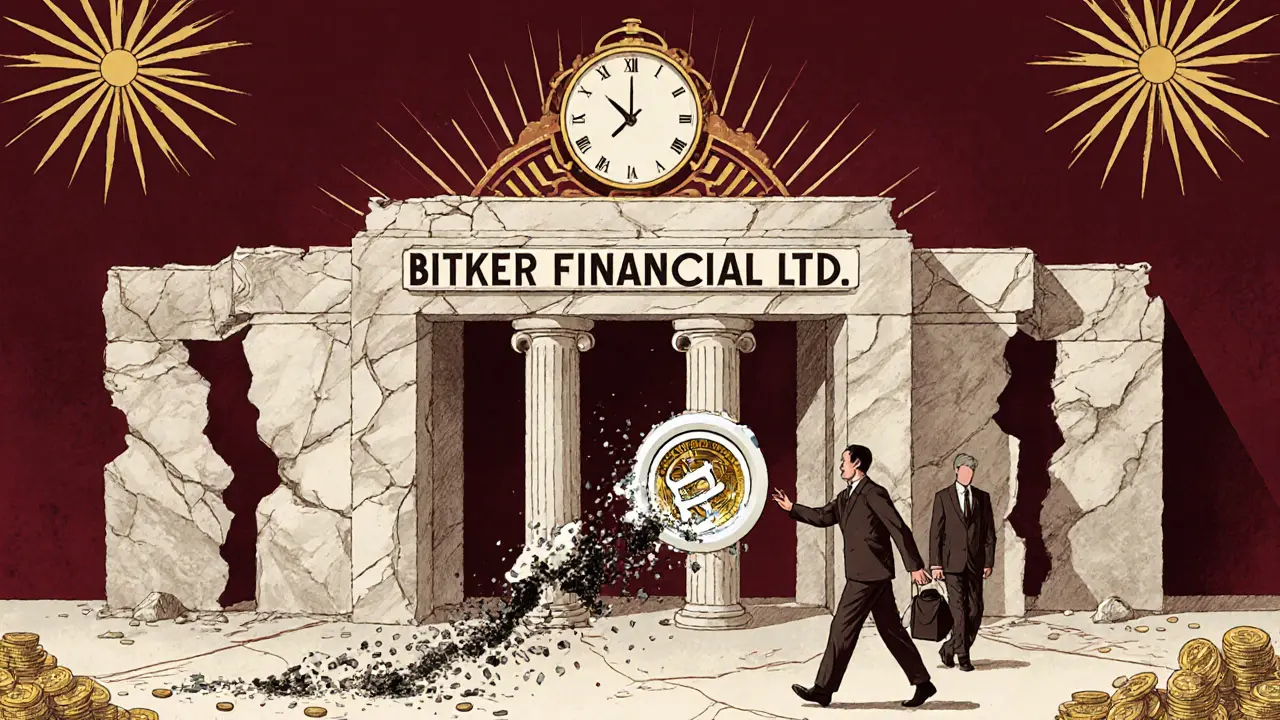Crypto Exchange Scam Detector
Check Exchange Legitimacy
Use this tool to identify potential scam indicators based on real-world examples like BITKER. Enter details about the exchange you're considering.
Important: This tool checks for common scam indicators based on real cases like BITKER. It does not guarantee absolute safety - always verify through official channels.
BITKER was never a real crypto exchange. It was a carefully crafted lie designed to steal money from people who trusted it. If you’re reading this because you’re wondering if BITKER is safe to use, the answer is simple: BITKER shut down in July 2021, and every dollar deposited by users disappeared with it.
How BITKER Trickled in New Users
BITKER didn’t grow through word of mouth or solid performance. It grew through ads. Facebook and Instagram ads targeted new crypto users with promises of zero-fee trading, instant withdrawals, and access to 75+ cryptocurrencies. The platform looked polished - clean interface, flashy graphics, fake testimonials. It even claimed to be licensed by authorities like the SEC and FCA, which it wasn’t. No record exists of BITKER ever applying for a license anywhere. The onboarding process was designed to be fast and easy. All you needed was an email. No ID, no proof of address, no KYC - until you tried to withdraw. Then, suddenly, you’d be asked for documents. And once you sent them? Your account would freeze. Support vanished. The chatbot stopped replying. That’s how it worked for nearly every victim.The Numbers That Lied
BITKER claimed to handle 200,000 transactions per second. That’s more than Visa. Realistic? No. Blockchain analysts from TRM Labs found that 92% of all trades on BITKER were fake. Bots traded with each other to inflate volume. The platform showed high liquidity, but it was all smoke and mirrors. Bitcoin was listed at $36,200 on BITKER while the real market price was $33,800. That 7% difference was bait. People thought they could buy low and sell high. But when they tried to cash out, the withdrawal button disappeared. Funds didn’t sit in wallets. They were moved out immediately after deposit - straight to mixer services like Tornado Cash, designed to erase the trail.Technical Lies Behind the Platform
BITKER ran on an old, unpatched version of Peatio, an open-source exchange codebase. Security researchers found it had a known vulnerability (CVE-2020-13544) that allowed anyone with basic tech skills to drain funds. Yet BITKER never fixed it. Why? Because they didn’t want it to be secure. They wanted users to deposit, then vanish. No cold storage. No multi-signature wallets. No insurance. Not even a basic backup system. User funds were held in hot wallets - the kind hackers target. And guess what? Those wallets were controlled by the operators. Every deposit was a direct transfer to their own wallets. No middleman. No delay. Just theft.
What Happened When Users Tried to Withdraw
After June 15, 2021, no one successfully withdrew from BITKER. Not one person. Reddit threads, victim groups on Telegram, and forums like Revain.org are full of the same story:- Deposit $500, $1,000, or even $10,000.
- Wait a few days for the ‘withdrawal’ button to appear.
- Click it - and get a message: ‘Your account is under AML review.’
- Wait another week. No reply.
- Check your balance - it’s gone. Account says ‘0’.
Why No One Got Their Money Back
After BITKER shut down, victims pooled resources to hire blockchain investigators. Chainalysis, CipherTrace, and CertiK all confirmed the same thing: the stolen funds were laundered through 17 different mixing services and 217 separate transactions. The money was converted into privacy coins like Monero and then scattered across hundreds of wallets. The UK’s National Crime Agency closed its investigation in March 2022. INTERPOL confirmed the operators remain unidentified. There are no arrests. No lawsuits. No recovery. The money is gone. Forever.How BITKER Compared to Real Exchanges
Real exchanges like Bitstamp, Kraken, and Coinbase don’t vanish. They’ve been around for over a decade. They’re regulated. They hold insurance. They publish transparency reports. They have real customer support teams. Bitstamp processes over $1 billion in daily volume. Kraken insures $250 million in customer funds. Coinbase has over 100 million users. BITKER? It had 112 unique depositing addresses total. Most users deposited under $1,000 - because they were testing the waters. And then they lost it all. BITKER didn’t compete. It preyed. It targeted people who didn’t know how to spot a scam. It used fake reviews, copied content from Binance Academy, and created fake company names like ‘BITKER Financial Ltd.’ - none of which exist in any government registry.
What You Can Learn From BITKER
BITKER is now a textbook example of a crypto exit scam. Here’s what you need to remember:- If an exchange has no verifiable team, no license, and no physical address - walk away.
- If trading volume looks too high to be real - it probably is. Check CoinGecko or CoinMarketCap for independent data.
- If you can’t withdraw after depositing - that’s not a bug. It’s the scam.
- No KYC upfront? That’s a red flag. Legit exchanges require ID before you trade.
- Always check if an exchange is listed on CoinGecko or CoinMarketCap. BITKER was delisted on July 7, 2021 - the day after it vanished.
Is There Any Hope for Recovery?
No. The funds are gone. The servers are offline. The domain bitker.com now redirects to phishing pages. The people behind it are still anonymous. No government agency has recovered a single cent. Some victims joined Telegram groups to share stories and try to organize legal action. But without knowing who ran the platform, and with funds laundered across 200+ transactions, legal recovery is impossible.Final Warning
BITKER doesn’t exist anymore. But copycats do. New platforms pop up every month with the same playbook: fake volume, fake support, fake licenses, then vanish. Don’t be the next victim. If you’re looking to trade crypto, stick to platforms with a proven track record. Use exchanges that are transparent, regulated, and have been around for years. Don’t chase promises of quick profits. Real crypto trading is hard enough without adding scammers to the mix.BITKER was never a choice. It was a trap. And it worked - until it didn’t. Now, it’s a lesson.
Is BITKER still operating?
No. BITKER shut down permanently on July 6, 2021. All services were terminated, domains redirected, and servers decommissioned. No official website or app exists anymore.
Can I get my money back from BITKER?
No. All stolen funds were laundered through privacy coins and mixer services. Investigations by Chainalysis, INTERPOL, and the UK’s National Crime Agency confirmed zero recovery prospects. The money is gone for good.
Was BITKER regulated?
No. BITKER held no licenses from any financial authority, including the SEC, FCA, MAS, or any other global regulator. Claims of compliance were false and used to trick users.
How did BITKER steal money?
BITKER used a modified, insecure version of open-source exchange software with backdoors. Funds were moved immediately after deposit to wallets controlled by the operators. Withdrawals were blocked after users deposited larger amounts, and customer support vanished.
Are there other exchanges like BITKER today?
Yes. New exit scams appear regularly, often using the same tactics: fake volume, no KYC, aggressive ads, and sudden withdrawal blocks. Always check if an exchange is listed on CoinGecko, has a real team, and is regulated before depositing funds.
How can I avoid crypto exchange scams?
Stick to well-known exchanges like Coinbase, Kraken, or Bitstamp. Avoid platforms with anonymous teams, no regulatory info, or promises of high returns. Always test with a small deposit first. If withdrawals are delayed or blocked, stop using it immediately.




Chris Hollis
November 3, 2025 AT 21:38BITKER was never even a real platform. Just a phishing page with fake APIs and bot trades. The whole thing was built to look legit until the money hit their wallets. No one got out. Not one person. And now they're gone. End of story.
Jeana Albert
November 5, 2025 AT 20:36OMG I LOST $8K TO THIS THING. I STILL HAVE THE SCREENSHOTS. THEY LIED ABOUT BEING LICENSED. THEY LIED ABOUT WITHDRAWALS. I EVEN SENT THEM MY PASSPORT AND THEY STILL STOLE IT. THIS ISN'T A SCAM. THIS IS A CRIME. WHY ISN'T THE FBI DOING ANYTHING?
Natalie Nanee
November 6, 2025 AT 18:19People keep falling for this because they want to believe in easy money. There’s no such thing. If it sounds too good to be true, it’s a trap. And if they don’t do KYC upfront? Run. Don’t walk. This isn’t rocket science.
Angie McRoberts
November 8, 2025 AT 13:19Wow. Just... wow. I read this whole thing and I’m not even mad. I’m just sad. Sad that people thought this was real. Sad that no one stopped it sooner. Sad that the victims are still paying for it. I hope this post saves someone.
Diana Smarandache
November 10, 2025 AT 12:41It is imperative to recognize that BITKER constituted a fraudulent financial instrument predicated upon deceptive advertising, noncompliance with international regulatory standards, and the deliberate exploitation of novice investors. The absence of any verifiable corporate entity or licensed operational framework renders its existence not merely unethical but criminally negligent.
Allison Doumith
November 12, 2025 AT 12:40It’s funny how we think we’re smart until we’re not. We think we’re learning about crypto, but really we’re just learning how to lose. BITKER didn’t steal money. It stole hope. And now we’re left wondering if we were the fools or if the system was just designed to let this happen.
Scot Henry
November 14, 2025 AT 00:39My cousin lost everything to something like this. I told him to check CoinGecko first. He didn’t. Now he’s not talking to anyone. Just sits there scrolling. This stuff breaks people. Not just wallets.
Pranjali Dattatraya Upadhye
November 16, 2025 AT 00:20Oh my god, I just saw this and I felt my heart drop. I just deposited $300 into a new exchange last week-no KYC, super fast withdrawals, tons of coins. I was so excited. Now I’m deleting the app. Thank you for this. I’m so scared right now.
Sarah Scheerlinck
November 16, 2025 AT 01:08Thank you for writing this. I know how hard it is to relive this. I lost my savings too. I’m not angry anymore. I’m just trying to help others avoid it. You’re not alone.
Robert Bailey
November 16, 2025 AT 18:57Stay smart out there. Crypto’s wild but you don’t need to be a hero. Stick to the big names. They’re boring. But they’re real.
Wendy Pickard
November 18, 2025 AT 00:14I read this at 3am and just cried. Not because I lost money. Because I almost got sucked in. I almost did it. Thank you for posting this before it was too late for me.
Sunidhi Arakere
November 19, 2025 AT 23:51BITKER is dead. But the same people are building new sites. They change the name. Same code. Same tricks. Watch out.
Angie Martin-Schwarze
November 21, 2025 AT 12:40they said my account was under review for 4 months then it just dissapeared. i still check the site sometimes. like a bad habit. i know its gone. but i still hope.
Fred Kärblane
November 22, 2025 AT 02:48BITKER’s architecture was a textbook exploit vector-unpatched Peatio, no cold storage, hot wallets controlled by ops. The 92% fake volume? That’s not incompetence. That’s a signal. If your exchange’s on-chain activity doesn’t match your claimed volume, you’re either lying or broken. BITKER was both.
Janna Preston
November 23, 2025 AT 22:04So… if I want to trade crypto, what’s the safest place to start? I don’t know anything. I just want to learn. Is Coinbase really the only option?
Meagan Wristen
November 24, 2025 AT 21:04Thank you for sharing this. I’m going to send this to my sister. She’s been talking about trying this new app called ‘CryptoFast’-same red flags. I’m glad I found this before she lost everything.